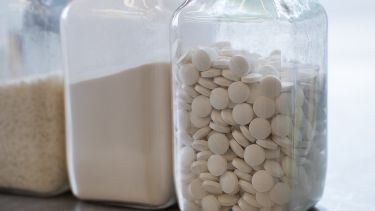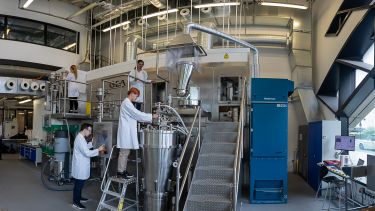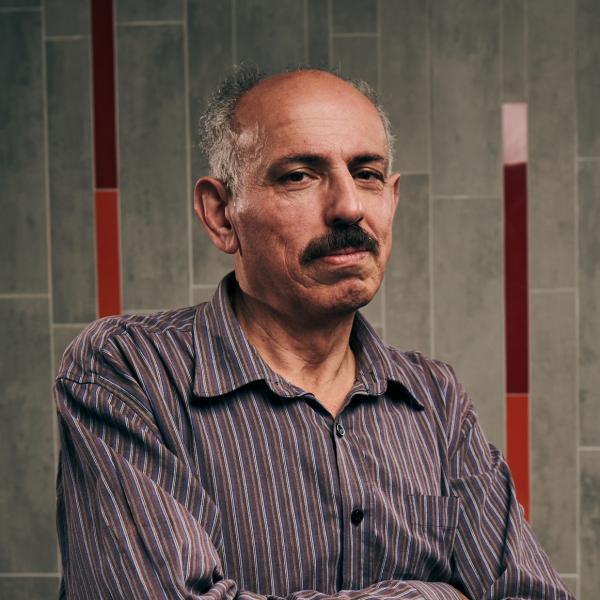The power of powder
From instant coffee to washing detergent, powders are part of our everyday life. But have you ever thought about how they are made and why some dissolve quicker than others? Professor Agba Salman is at the forefront of powder restructuring and particle science in academia and industry.

A powder is a solid substance of fine, loose particles. It has a multitude of purposes and is used across different industries. Powders are part of our everyday life; you drink them when you make instant coffee or hot chocolate, eat them when taking medication, wash your clothes with them, and put them on your face when applying makeup.
In contrast to its liquid counterparts, powder has a long shelf-life and is cheap to transport due to its lower volume. But grinding down a solid into the tiny particles of a powder doesn’t immediately create an effective product.
One way to modify the properties of particles is through granulation. Granulation is the process of transforming the size, shape, surface and density of particles to improve the product quality, such as helping it to dissolve faster.
With a career in researching granulation, Professor Agba Salman from the Department of Chemical and Biological Engineering works across all stages of the granulation process to monitor the best ways to restructure the particles of a product and improve it.
Agba Salman is a Professor of Particle Technology, MSc Pharmaceutical Engineering Course Director and Director of the Diamond Pilot Plant at the University of Sheffield. His research projects have received funding from The Engineering and Physical Sciences Research Council (EPSRC), The Biotechnology and Biological Sciences Research Council (BBSRC) and industry leaders to address knowledge gaps in particle processing and improve the quality of consumer-facing products.
Restructuring particles: how does it work?
Have you ever tried to dissolve a powder but instead created a sticky clump that floats on top of the liquid? This is down to the surface area of the particles and granulation is one way of restructuring the particles to solve this problem.
Granulation collects particles together to form a larger particle, known as a granule. This can be achieved with or without the use of a binding agent.
Granules increase the surface area per unit mass of a group of particles. The more particles that are added to the granule, the greater the surface area becomes and the easier it is for the liquid to dissolve.
But how can granulation be used to influence the quality of a powdered product?
Working with industry
For many powder brands, the ability to compete effectively in a market relies on the time it takes for the product to dissolve. But just as you wouldn’t like a vitamin tablet to take three days to dissolve inside your body, different industries require different dissolving properties. For example, a detergent should dissolve in approximately 30 seconds but a powder fertiliser should take between 5 and 6 weeks. It is only through intensive research and academic understanding that the particle properties of powders can be changed to achieve the desired end results.
To help companies across various industries remain competitive, Professor Salman and his team work closely with leading brands such as Nestlé, AstraZeneca, GlaxoSmithKline, Procter & Gamble, and Unilever to improve consumer products by modifying their particles.
With years of expertise in particle processing and manufacturing his research has been vital to improving the performance and quality of various products.
Food powders range from gravy granules to protein powders but all of them require different dissolving properties. Physical stability relates to the ability of a material to remain physically unchanged over time during manufacturing, storage and use. Agba is using novel approaches to powder restructuring to improve the physical stability of food powders.
Pharmaceutical industries face high risks with issues of quality control and supply chain management, yet many industries continue to rely on batch manufacturing. Continuous manufacturing technology, a method for manufacturing products from start to finish on an uninterrupted production line, provides an opportunity to reduce excess costs and quality issues. Agba is working closely with pharmaceutical companies to use particle restructuring methods to improve the quality of oral dosage products manufactured in this way.
Calcium carbonate, better known as limescale, is a white chalky substance formed as a result of calcium and magnesium build-up in hard water. It creates problems when it forms in oil wells and production facilities and will cause damage to machinery if left untreated. Through the method of online monitoring, Agba has worked with leaders in the oil industry to reduce clusters of calcium carbonate in facilities by conducting laboratory investigations to reduce the growth of the limescale.
Agba’s work is also helping improve sustainability in the fertiliser industry by using granulation to increase the stability of particles. While adhering to new regulations, he has led projects to help users increase the efficiency, and therefore sustainability, of their fertilisers through particle modification.
“There is a trend across industries to reduce the amount of plastic used but paper and biodegradable packaging simply aren’t as effective. Rather than focusing on plastic, we’re looking at ways to change the structure of the product to increase its shelf-life so it doesn’t require plastic packaging. It is far better to play with the product itself than compensate for less effective packaging” says Agba when speaking about future projects.
Sheffield's leading facilities
Agba is the Director of the Diamond Pilot Plant (DiPP), the UK’s first continuous powder processing plant located in a University. It is capable of processing 25 kilograms of tablet per hour and is used for teaching and research, ad well as training employees of UK companies in the latest modern engineering processes and tools.
The DiPP is the most expensive piece of equipment found in the University's iconic Diamond Building. It is the same model used by Glaxosmithkline and Pfizer with state-of-the art simulations and control systems.
The DiPP also uses digital twins, a virtual simulation that creates a real-time digital counterpart of a physical process, to theoretically test new granulation techniques on the machine. As well as reducing the high costs of a trial and error process with real materials, it also provides a useful tool for training and teaching. Professor Salman and his students use this facility for industry-sponsored projects and to provide students with real-world industry experience and knowledge.
All the students in my course meet industry experts to really understand how the industry works. This, as well as the DiPP, prepares the students for their careers once they have finished their studies. Contrary to the name, the DiPP is not a pilot and is already being used to drive solutions to industry problems. Future engineers will continue to explore particle manufacturing processes in a safe environment using our world class control systems
Professor Agba Salman
Professor of Particle Technology, MSc Pharmaceutical Engineering Course Director and Director of the Diamond Pilot Plant
Written by Alina Moore, Research Communications Coordinator




